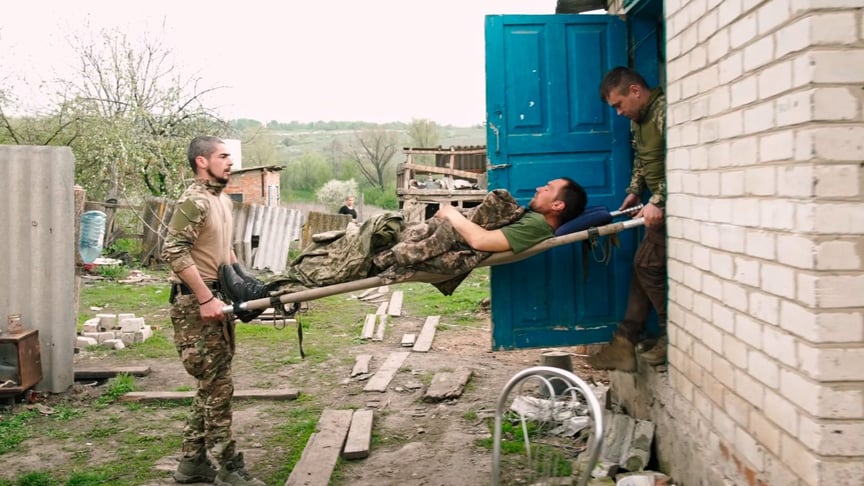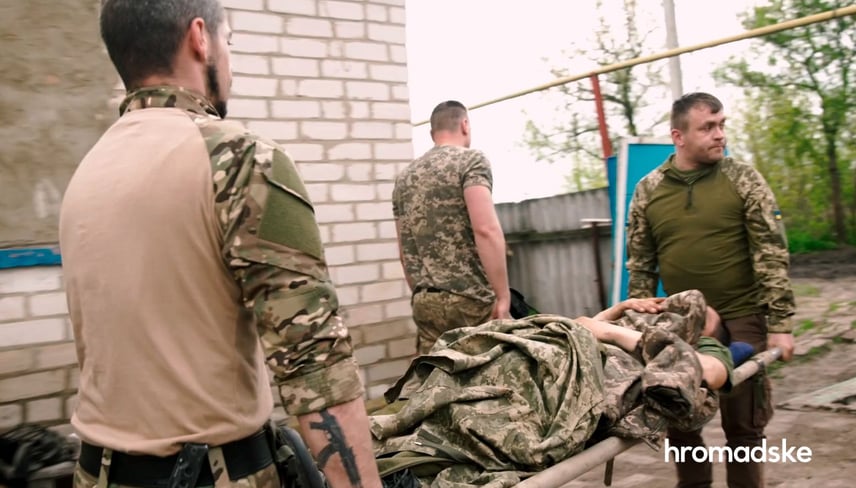'Open the window, throw up and drive on': everyday life of medics at the front line

"Lie down!" someone shouts. The scene before my eyes is hazy. I feel dizzy; my legs can no longer support me. I realize this is a dream.
I awake to the sound of artillery fire outside the window. I get out of bed - it's midnight. An SUV roars outside. As soon as the engine cuts, someone slams the car door loudly. The building springs to life. I quickly regain my bearings, remembering I'm near the front at a stabilization unit for the 10th Mountain Assault Brigade.
Andriy, our senior surgeon, runs outside first. Outside, in the pitch black, amid the dim red glow of the headlights, paramedics help soldiers out of the medevac (medical evacuation vehicle -ed.). One fighter is held up by the arm. They slowly lead the men to the veranda and into the kitchen.
"What happened to your eyes?" Andriy asks one soldier.
"My left eye was burned. My face isn't too bad, but the eye...Before, in the dugout, I was totally f**king blind. Now at least I can blink," he says.
Valeriy, a veterinarian in civilian life, enters the kitchen with a flashlight in his mouth. He inserts a catheter and IV drip into the wounded soldier's eye.
"Was it an artillery strike that hit you?"
"A direct ATGM hit on our observation post," he replies.
"Do you need a sedative?" Andriy interrupts.
"Can I take some to drink before bed so I fall asleep right away? I haven't been sleeping well lately."
The doctors examine the soldiers for a few minutes and provide medical care. Then they take them to a vehicle - the men will be driven to a military hospital 40 minutes away. Driver Volodya, who works at the stabilization unit, says today is relatively quiet compared to previous days, when more than seven wounded arrived overnight.
"Russkies will be Russkies: they don't care if we can evacuate the wounded or not. They just shell down from above. It's a bit calm now, otherwise we'd have wounded every day," Volodya says.
He takes the soldiers to the hospital and returns. At night, the staff at the station sleep with one eye open, because work can come at any moment.
"We are just being manned up, but people need to rest"
The smell of fried meat and coffee drifts from the kitchen in the morning. Maryana, who also works in the medical company, prepares breakfast for everyone. She and Andriy are the only ones in the group with medical degrees; Maryana studied at a medical college. She joined the 10th Brigade for the first time in 2017, when she was only 19. Then she got pregnant and went on maternity leave, returning to serve just before the full-scale invasion. Her son is four years old.
"How long has it been since you've seen him?" I ask Maryana as she plates the meat.
"I was there with him on his birthday a month ago. At first, we hadn't seen each other for nine months and he barely recognized me - I was something familiar yet strange. The last time he recognized me, he cried and wouldn't let me go."
As everyone arrives for breakfast, driver Liubomyr says, "It would be nice if this brigade got a break in the rear. I see brigades rotating in and out; There are some rotations, but as soon as we arrived here, we are only being re-staffed. People need rest."
Liubomyr has been an army driver since 2001. Before the full-scale war, he planned to retire but the Russian offensive changed that. This is his eighth rotation to Donetsk Oblast, so he knows his way around the area.
"Guys from other brigades say 'It'd be better if we were sent to Kherson again - so many Russian soldiers here,' though Russians have only advanced 53 kilometers here in a year, from Zolotarivka to Bakhmut. With such a large army, as they boast, 53 kilometers should have been covered in a week," says Liubomyr.
After breakfast, the guys start making pull-up bars. In the morning, they rarely get the wounded brought in.
"They disrupted our entire evacuation process a few weeks ago. Guys just pull wounded from positions - they immediately throw VOGs (explosive devices). Now they only evacuate at night, because during the day you can barely get anyone out of their positions. Their artillery strikes pounded our infantry so accurately that the guys brought in were missing torsos and lower limbs," says Vova, another driver.
He mostly transports the dead. Sometimes body parts are handed to him in bags: "There have been cases where missing persons were searched for a long time, and when they were found and brought back, they had maggots in their mouths and you couldn't recognize them. It is very difficult to transport them because of the smell. You open the window, vomit and drive on. For me, it's like the smell of caramel with something rotten, you can't confuse it with anything else."
Vova continues digging the hole for the horizontal bars with even more zeal, then jokes about other topics. I ask if he remembers all the horrors he saw during this time, or if his memory erases such things. Vova says the worst cases are most distinct in his memory.

"In Europe, you don't feel life as much as you do here, next to death"
In the afternoon, an engine roars outside again. Everyone runs out. This time, the medevac drivers calmly exit the vehicle - they've brought a soldier with shrapnel in his shoulder blade, but he walks on his own.
"We were digging a trench, I was smoking, and it hit me from the side. I didn't hear a whistle, nothing, just an explosion. A shell hit the trench," the soldier says.
The fragment will be removed at the hospital. The soldier says it doesn't bother him, just burns a little.
He's told to wait at the stabilization unit in case more wounded arrive to join him on his way to the hospital. We sit on the street near the house. The soldier says he's from Kolomyia. He was recently mobilized and this is only his third shift.
An hour ago, this man was almost killed by a Russian shell, yet now he's enjoying the stories told by medic Maryana. She plays with a cat that was adopted by them and gave birth to kittens, then got pregnant again: "If we knew that would be the case, we would have kept livestock." We all laugh.
"Life is most intense right next to death," says Andriy, a medic. "Somewhere in Europe, you don't feel life as much as you do here in Ukraine, next to death."
The May sun begins to bake our heads. The momentary silence is abruptly broken by the whistle of an incoming shell. We jump to our feet and run inside.The shell flies further and explodes not far from us above. A few minutes later, another follows. The Russians are seeking a new target.
- Share:
